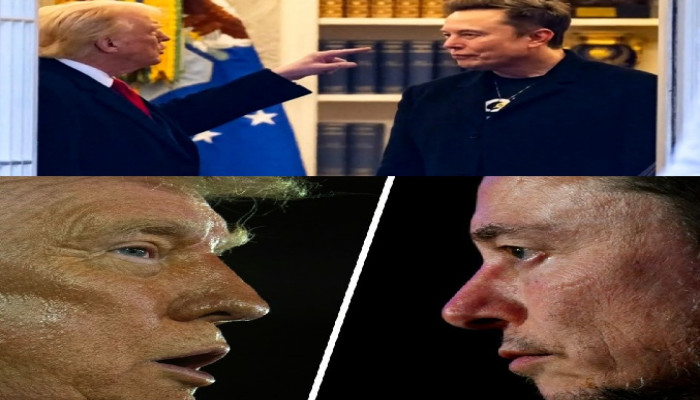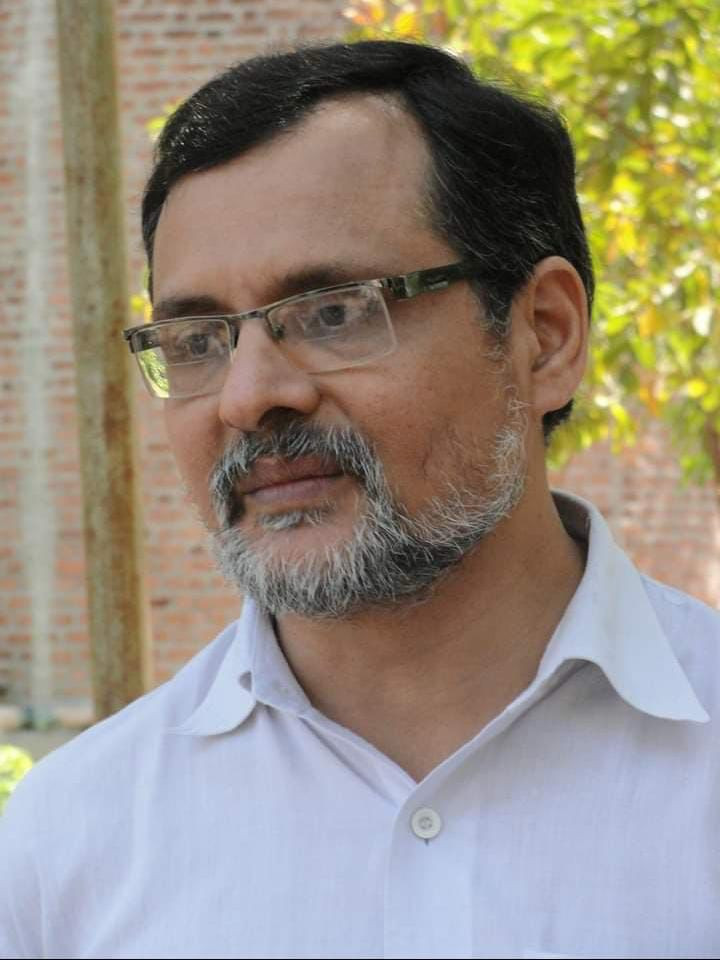Elon Musk - The Other Side of 'The Rocket Man'
- In Current Affairs
- 01:30 PM, Jul 04, 2025
- Viren S Doshi
Elon Musk (Chief Executive Officer of Tesla, SpaceX and Chairman of X Corp) is a heady cocktail of visionary entrepreneurship, political lightning rod and geopolitical flashpoint.
His typical American-looking business empire, particularly Tesla, Inc. and Space Exploration Technologies Corporation (SpaceX), paradoxically thrives on deep ties with the Chinese Communist Party (CCP)-occupied China, leveraging the CCP's markets and supply chains for extraordinary growth.
These connections, however, have sparked concerns about Musk’s reliance on CCP-controlled industries and potential national security risks, especially under the second Trump administration, led by Donald Trump (47th President of the United States), which has taken up cudgels against CCP-occupied China.
The administration’s decision to relieve Musk from his role as co-head of the Department of Government Efficiency (DOGE) and sever his access, preceded by Vivek Ramaswamy’s (Republican presidential primary contestant and biotech entrepreneur) smartly well-timed dissociation from Musk and DOGE, underscores the red lines.
This report explores Musk’s operations in CCP-occupied China, their dependence on its supply chains, the Trump administration’s actions and Musk’s political journey and prospects; weaving a narrative of profit, influence, and geopolitical complexity.
Musk’s Business Ventures, specifically about CCP-Occupied China
Tesla
Tesla Inc. is deeply integrated into CCP-occupied China. The Shanghai Gigafactory, Tesla’s largest manufacturing facility, produces over 50% of its global vehicle output (approximately 900,000 vehicles annually) and drives significant profits. Opened in 2019 as the first wholly foreign-owned automotive plant in CCP-occupied China, it received $1.4 billion in low-interest loans from CCP-occupied China's state-owned banks and a reduced 15% corporate tax rate (compared to the standard 25%) from 2019 to 2023, facilitated by Li Qiang (current Premier of CCP-occupied China), then Shanghai’s Communist Party Secretary.
In February 2025, Tesla opened a second Shanghai factory for 10,000 Megapack batteries annually, its first such facility outside the United States.
CCP-occupied China accounts for about 40% of Tesla’s global sales, making it the second-largest market.
Tesla’s showroom in Xinjiang, a region tied to human rights abuses, has drawn criticism from Marco Rubio (current U.S. Secretary of State and acting National Security Adviser).
Partnerships with CCP firms like Contemporary Amperex Technology Co. Limited (CATL) for batteries and another CCP company, Baidu, for self-driving technology further embed Tesla in CCP-occupied China’s opaque ecosystem.
Space Exploration Technologies Corporation (SpaceX)
SpaceX is a major U.S. military contractor with $22 billion in federal contracts. While it lacks direct manufacturing in CCP-occupied China, reportedly, some records show investments in SpaceX from entities of CCP-occupied China via secret hubs like the Cayman Islands.
Musk’s suggestion that Taiwan become a “special administrative zone” of CCP-occupied China lent credence to speculation that the CCP views him as a conduit for influencing U.S. policy on Taiwan and other issues.
Other Ventures
Musk’s other companies, The Boring Company and Neuralink, have minimal direct ties to CCP-occupied China. The social media platform X is blocked in CCP-occupied China, but its algorithms are still debated to have a hangover of its past leftist avatar. However, Tesla’s financial success in CCP-occupied China indirectly funds these ventures, forming the backbone of Musk’s wealth.
Tesla's Dependence on CCP-Occupied China’s Supply Chains
Tesla’s operations rely heavily on supply chains in CCP-occupied China, often described as monopolistic due to the CCP’s control over strategic industries. About 40% of Tesla’s battery supply chain comes from companies like CATL, which dominates global lithium-ion battery production through CCP subsidies and control over materials like lithium, cobalt, and graphite. The Shanghai Gigafactory’s nearly fully localised supply chain, designed to meet the CCP’s “generous” incentives, ties Tesla’s cost efficiency to CCP-controlled suppliers, making it vulnerable to disruptions or price manipulations that could give the CCP leverage over Musk.
U.S.-CCP trade tensions, including a 10% tariff on imports from CCP-occupied China imposed by the Trump administration in February 2025, highlight Tesla’s exposure.
While Tesla’s localised supply chain in CCP-occupied China may mitigate some tariff impacts, a broader U.S.-CCP economic decoupling could disrupt operations, given its reliance on CCP-controlled suppliers.
Trump Administration’s Confrontation and Musk’s Removal from DOGE
The Trump administration has confronted Musk with the background of his ties to CCP-occupied China, culminating in his removal from DOGE and loss of access to the administration.
Key developments include-
Vivek Ramaswamy’s Dissociation from Musk and DOGE: Vivek Ramaswamy, initially appointed to co-lead DOGE with Musk, distanced himself from both Musk and the initiative in January 2025 with his shift toward a gubernatorial bid in Ohio. But Vivek cited disagreements over Musk’s technology-based approach as against his legal legislative approach and reportedly also expressed concerns about his ties to CCP-occupied China, stating in a January 2025 interview, “The influence of (CCP-occupied China) Beijing on any leader with such extensive business interests there cannot be ignored.”
Pentagon Briefing Incident: In March 2025, reports surfaced that Musk was slated for a Pentagon briefing on U.S. military plans regarding CCP-occupied China, raising concerns due to his business ties with the CCP. Trump cancelled the briefing, stating, “Elon has businesses in [CCP-occupied] China, and he would be susceptible, perhaps, to that,” signalling direct worry about Musk’s CCP connections.
Musk’s Removal from DOGE: On May 29, 2025, Musk announced his departure from DOGE, citing the end of his 130-day term as a special government employee. A White House official confirmed his offboarding, severing his access to the administration.
Public Feud: By June 2025, Trump and Musk’s relationship deteriorated to open spats. Musk criticised Trump’s “Big Beautiful Bill,” a tax and budget legislation, as deficit-increasing, prompting Trump to threaten to cut Musk’s government contracts. Musk countered that Trump’s 2024 victory relied on his $275–$300 million in campaign donations. The feud, coupled with concerns about Musk’s CCP ties, contributed to Musk's further isolation.
Congressional Criticism: Lawmakers like John Moolenaar (current Republican Chairman of the House Select Committee on the CCP) and Raja Krishnamoorthi (current Democratic Ranking Member of the House Select Committee on the CCP) warned that the CCP viewed Musk as an asset to bypass China hawks like Rubio.
Steve Bannon (former White House Chief Strategist) called Musk a “CCP puppet,” citing Tesla’s Shanghai operations as “100% controlled” by the CCP.
Ron Wyden (current Senate Finance Committee Ranking Member) flagged Musk’s access to sensitive U.S. data via DOGE as a security risk.
Jim McGovern (current U.S. Representative) accused Musk of prioritising CCP-occupied China’s interests during a December 2024 spending bill debate.
Past Connections and CCP Meetings: Musk’s April 2024 meeting with Li Qiang to secure Tesla’s Full Self-Driving approvals, coinciding with CCP-occupied China’s approval of Tesla’s data security compliance, heightened concerns about his influenceability.
To sum up, despite Musk’s significant campaign and consequent support for Trump, overshadowing CCP ties led to his removal from DOGE on May 29, 2025, leaving him without formal access to the administration.
Is the CCP “Dead Against” Conservative Nationalist Trump?
The CCP’s stance toward Trump, shaped by his trade policies, is reportedly hostile. Trump’s first term, marked by the “Wuhan virus” label and trade wars, set a confrontational tone. His second term’s tariff on imports from CCP-occupied China and appointments of CCP hawks like Rubio signal continued tension.
Xi Jinping (current President of CCP-occupied China) has expressed disdain for U.S. policies, and diplomats have praised Musk while criticising Trump’s tariffs, suggesting the CCP now aims to leverage Musk to counter Trump’s conservative nationalist agenda.
Musk’s Political Journey and Prospects
Musk’s political evolution has been a heady cocktail of ambition, controversy, and faltering influence.
Early Neutrality: Musk voted for Democrats like Hillary Clinton (2016) and Joe Biden (2020), aligning with progressive causes like climate change via Tesla.
Shift to Conservatism: By 2024, Musk became the largest Republican donor, contributing $275–$300 million to Trump’s campaign and others through the America PAC. He campaigned for Trump and proposed DOGE, but his embrace of far-right causes, including support for Germany’s Alternative für Deutschland (AfD) party on one hand, with CCP ties on the other, drew criticism.
Inauguration Gesture Controversy: On January 20, 2025, at Trump’s inauguration rally at Capital One Arena in Washington, D.C., Musk made gestures that sparked widespread controversy. After thanking the crowd for electing Trump, Musk slapped his right hand on his chest and extended his arm upward, palm down, repeating the gesture to the crowd behind him while saying, “My heart goes out to you.”
Historians Ruth Ben-Ghiat and Claire Aubin labelled the gestures as Nazi or fascist salutes, citing their resemblance to the “Sieg Heil” gesture used in Nazi Germany. Democratic lawmakers like Jerry Nadler (current U.S. Representative) condemned the gesture as antisemitic, with Nadler stating on X, “This abhorrent gesture has no place in our society.”
Far-right groups, including neo-Nazi leader Christopher Pohlhaus and Gab founder Andrew Torba, celebrated the gesture, with posts on Telegram calling it a “Hail Trump” moment. Musk dismissed the criticism but later posted Nazi-themed puns, escalating the controversy.
In Germany, where such gestures are illegal, the gesture prompted investigations and outrage, with Die Zeit stating, “A Hitler salute is a Hitler salute.” The controversy, amplified by Musk’s AfD support and prior antisemitic posts (e.g. endorsing a 2023 claim that Jews hate white people), coupled with CCP ties, further damaged his public image, with only a 35% approval rating in April 2025.
Future Prospects: As reported, Musk is exploring a new party for “moderate voters” to counter Trump; this becomes important against the backdrop of his CCP ties. However, his failure to secure a Wisconsin Supreme Court candidate despite spending a hefty $25 million and declining Tesla sales signal challenges. His wealth and X platform could sustain his influence, but the inauguration controversy and CCP ties complicate his prospects, potentially alienating moderates and conservatives.
Musk’s Efforts and Results in India
Musk’s engagement with India has been ambitious but limited:
Tesla’s Market Entry: Musk met PM Narendra Modi in April 2024, announcing plans for a Tesla factory in Gujarat or Maharashtra. High import duties (up to 100% on electric vehicles) and India’s “Make in India” policy have stalled progress, with no factory groundbreaking as of July 2025, amid competition from Tata Motors.
Starlink Expansion: Starlink registered in India in 2021 but faced delays over spectrum and security concerns. Conditional approval in 2025 has led to pilot projects in rural areas, but rollout remains limited.
Outcomes: Musk’s tweet in June 2024 about a “significant investment” in India contrasts with slow progress, unlike his success in CCP-occupied China.
Conclusion
Elon Musk’s heady cocktail of innovation, controversy and geopolitical entanglement thrives on CCP-occupied China’s markets and supply chains, creating a web of profit and dependency that critics argue gives the CCP leverage over him.
Trump administration’s removal of Musk from DOGE on May 29, 2025, severing his access, reflects concerns over his CCP ties, amplified by Ramaswamy’s January 2025 dissociation due to strategic disagreements and Musk’s CCP-occupied China connections.
The CCP’s opposition to Trump’s policies is clear, yet its supposed strategic use of Musk raises concerns. Musk’s political shift from neutrality to conservative activism, punctuated by the January 2025 inauguration gesture controversy criticised as Nazi salutes, faces uncertainty post-DOGE, with his India ventures lagging behind CCP successes.
As Musk refocuses on his businesses, his role in global geopolitics remains a flashpoint, balancing wealth with questions of loyalty and influence.
Disclaimer: The opinions expressed within this article are the personal opinions of the author. MyIndMakers is not responsible for the accuracy, completeness, suitability, or validity of any information on this article. All information is provided on an as-is basis. The information, facts or opinions appearing in the article do not reflect the views of MyindMakers and it does not assume any responsibility or liability for the same.







Comments